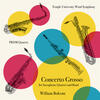Concerto Grosso for Saxophone Quartet and Band
By William Bolcom
- Lively
- Song Without Words
- Valse
- Badinerie
Concerto Grosso, written for the PRISM Quartet (which has included at different times a few of my former students in composition), was written purely as a piece to be enjoyed by performers and listeners. PRISM had mentioned wanting a concerto grosso for themselves. (To remind readers, a concerto grosso is a Baroque-era form involving a small group of instrumentalists, called the concertina, in dialog with the ripieno or large orchestra.)
Although each PRISM member is an excellent soloist, I took their request to mean that I should emphasize their group identity, their “fourness.” This immediately called up two precedents in my mind: the Schumann concerto for horn quartet which is very homophonic, and the many 20th century groups of all sorts which often dressed alike to emphasize their uniqueness, from the Four Lads and the Beatles to the Motown groups and countless others.
The first movement, Lively, in simple sonata form, evokes blues harmonies in both its themes. Song without Words, which follows, is a lyrical larghetto. The following Valse, which has a very French cast, begins with a long solo stretch for the saxophone quartet; the development of this theme alternates with a pianissimo Scherzetto section. The final Badinerie, a title borrowed from Bach, evokes bebop and rhythm-and-blues.
The orchestral version of this work was commissioned by New Sounds Music, Inc. for the PRISM Quartet, with support from a variety of funding agencies, and premiered in 2000. I did the band transcription in 2009, stemming from a request by Professor Michael Haithcock to enable the work to be performed on the Symphony Band’s upcoming tour of China. As a result, the version for band was commissioned by a consortium of bands organized by the University of Michigan, in partnership with Baylor University, Eric Wilson, conductor; Indiana University, Stephen Pratt, conductor; the University of North Carolina at Greensboro, Kevin Geraldi and John Locke, conductors; and the University of Texas at Austin, Jerry Junkin, conductor.
- Notes by composer William Bolcom

